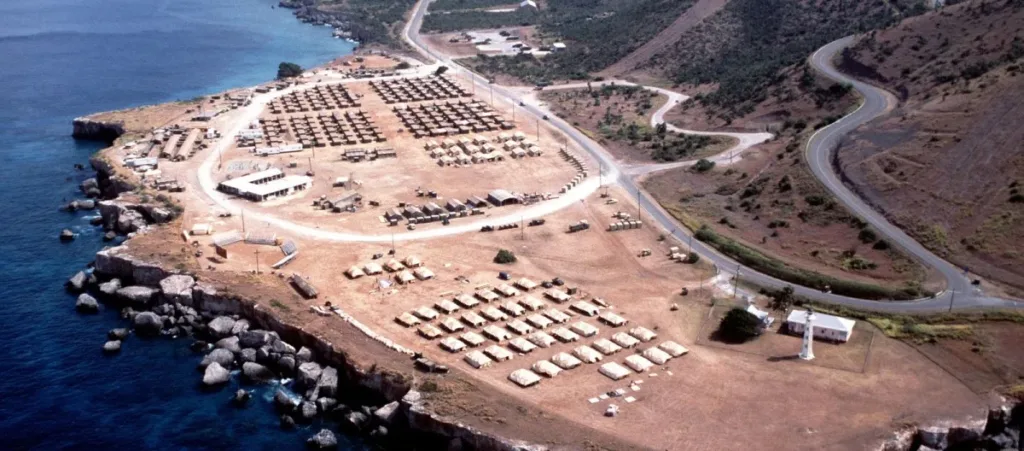Guantánamo Bay hosts the Abd al-Rahim al-Nashiri case, featuring a target trial date announcement and ongoing pretrial hearings. Delve into the judge’s unconventional military journey and the looming appeal, alongside the case’s importance for survivors and waiting relatives.

Why It Matters: Families are waiting
It has been a long wait for survivors of the attack and relatives of the sailors who were killed. A Saudi prisoner, Abd al-Rahim al-Nashiri, has been in U.S. custody since 2002 and was first charged in 2011, making his the longest-running capital case at Guantánamo Bay.
Paul Abney, a senior sailor on the ship, called the judge’s announcement “delightful words to hear.” He was in court on Monday for the hearings and has traveled to Guantánamo about 10 times since 2012 to watch the legal wranglings.
“Even if it doesn’t happen next year, the fact that he’s willing to put a target date down, and make it a goal to shoot for is, I think, inspiring,” said Mr. Abney, a retired Navy master chief.
What’s Next: More hearings
Colonel Fitzgerald has 14 more weeks of hearings on the 2024 calendar. Pretrial matters yet to be tackled include the admissibility of some evidence, proposed witnesses, whether Mr. Nashiri can be tried by a military commission, how to seat a panel of military officers and whether Mr. Nashiri would be entitled to administrative credit if he is convicted but not sentenced to death.
Even before court began, the judge issued an order with deadlines for both sides to prepare for trial. The timetable orders lawyers for Mr. Nashiri to provide prosecutors with a list of witnesses they would want to call to testify at the trial by Jan. 9.
Facts to Keep in Mind: An appeal looms
The judge announced the goal in his first hour on the bench. But he made no mention of a government effort to get an appellate panel to overturn a decision by his predecessor.
Colonel Acosta excluded, as tainted by torture, confessions the defendant made to federal agents at Guantánamo Bay after years of secret imprisonment by the C.I.A. Mr. Nashiri was subjected to waterboarding, rectal abuse and prolonged sleep deprivation. Prosecutors have asked the Court of Military Commissions Review to reinstate the confessions.
Regardless of which way the panel rules, defense or prosecution lawyers are expected to take the question to the U.S. Court of Appeals for the District of Columbia Circuit, a process that could last much of this year.
Last Time This Happened: 2020
In February 2020, Colonel Acosta set deadlines toward a February 2022 trial date for Mr. Nashiri. But the next month, the coronavirus pandemic forced the Guantánamo court to close for about 500 days. Colonel Acosta retired last year without setting a trial date.
Background: An unusual judge
On the bench on Monday, Colonel Fitzgerald said he has had “an unorthodox military career.” He enlisted in the Army after high school, served as a psychiatric specialist from 1986 to 1990 and then worked on Army medevac missions until 1999, all in the United States.
He left the service to attend college, taught high school and then chose law. He was in his second year of law school when the Cole was bombed and was in his final year during the Sept. 11, 2001, attacks. He returned to the Army as a lawyer in 2003 and was deployed to Iraq, Afghanistan and also the military prison at Guantánamo Bay in 2008.
At Guantánamo, he did a 90-day stint on a legal team that was created to respond to any new court filings for the detainees in light of a Supreme Court ruling, Boumediene v. Bush, that gave detainees meaningful review of their detention in federal courts. Colonel Fitzgerald called it “the mission that never came,” because “zero writs were filed on our watch.”
While he was there, Colonel Fitzgerald said he took the initiative to offer advice to the commander of a military police unit that did not have a resident staff lawyer and took tours of the prison, including the high-value detainee site where Mr. Nashiri was kept.
Colonel Fitzgerald is the only judge at military commissions who is known to have seen the detention facilities at Guantánamo. But he said he avoided making eye contact with the detainees and had no memory of who was held there.
Frequently Asked Questions
Why is the case significant?
The case involves Abd al-Rahim al-Nashiri case a Saudi prisoner held in U.S. custody since 2002, making it the longest-running capital case at Guantánamo Bay. It holds significance for survivors of the attack and relatives of the sailors who were killed.
2. What’s the judge’s announcement about?
The judge announced a target trial date, which is a hopeful sign for those awaiting justice. Colonel Fitzgerald aims to expedite proceedings, with 14 more weeks of hearings scheduled in 2024.
3. What pretrial matters are yet to be tackled?
Several pretrial matters remain, including the admissibility of evidence, proposed witnesses, and whether Mr.Abd al-Rahim al-Nashiri casecan be tried by a military commission. Additionally, considerations about administrative credit upon conviction are pending.
4. What about the looming appeal?
Despite the trial’s progression, an appeal looms, especially regarding the exclusion of certain confessions obtained under torture. Both defense and prosecution lawyers are expected to appeal to higher courts, potentially prolonging the legal process.
5. Who is Colonel Fitzgerald?
Colonel Fitzgerald, an unconventional judge with an unorthodox military career, presides over the case. Abd al-Rahim al-Nashiri case background includes service in the Army, followed by a transition to law. He’s known for his proactive approach and unique experiences, including his time at Guantánamo Bay.